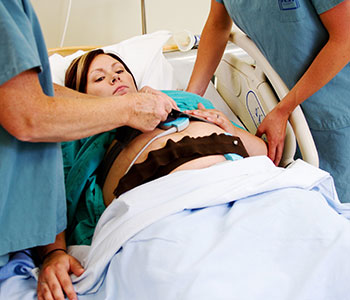Types of fetal monitoring that may be performed by your Chicago Obstetrician
Throughout pregnancy, your obstetrician will monitor your health as well as that of your growing baby. Tests are performed periodically during pregnancy, with type and frequency determined on a case by case basis. A higher-risk pregnancy will most likely involve a greater extent of fetal monitoring through various tests. In our Chicago women’s health practice, we have many years of experience with which we approach each new pregnancy. Our team explains the necessity of testing and details of such as needed to provide the parents-to-be with peace of mind.

The purpose of fetal monitoring is to, as accurately as possible, identify abnormalities. Two tests that may be recommended include the non-stress test and the Ultrasound.
Non-Stress Test (NST)
The non-stress test is one designed to monitor the baby’s heart rate, noticing a rise as an appropriate response to stimuli. This test involves the use of a monitor such as the one a mother is hooked up to during labor. No medication is given in the non-stress test because the idea is to see how the baby’s heart rate changes under normal circumstances.
During the non-stress test, a rise in heart rate may occur spontaneously without any type of stimulation. In some cases, however, mild encouragement such as a loud noise or the slight rub over the abdomen may be needed. Either on its own or in response to stimulation, the baby’s heart rate should increase slightly. Variability in the heart rate pattern should also be present. If this does not occur, further testing may be scheduled in order to confirm a thriving baby. It is important to note that many babies who do not initially show the normal reaction in the non-stress test are confirmed healthy in the follow up Biophysical profile.
Biophysical Profile (BPP)
In the event of an abnormal or non-reactive non-stress test, the biophysical profile may be ordered to obtain reassurance of fetal well being. It is a 30 minute ultrasound that looks at fetal breathing, tone, movement, and the fluid around the baby, in addition to the heart rate tracing. If it is normal, that has been associated with fetal reassurance for a week.
Fetal monitoring such as the non-stress and biophysical profile allow us to more readily approach labor with an understanding of what mother and baby may face. These are just two of the various forms of fetal monitoring that may take place during a pregnancy. Your physician will recommend tests and explain the details of such as needed.
Pregnant women may also get a pelvic and fetal ultrasound for growth and fluid evaluation. This may occur if the fundal height is smaller than expected, or there has been a history of these issues previously.
Receive the best care during your pregnancy from an experienced OBGYN in Chicago. Call Northwestern Women’s Health Associates, today.




Comments are closed.